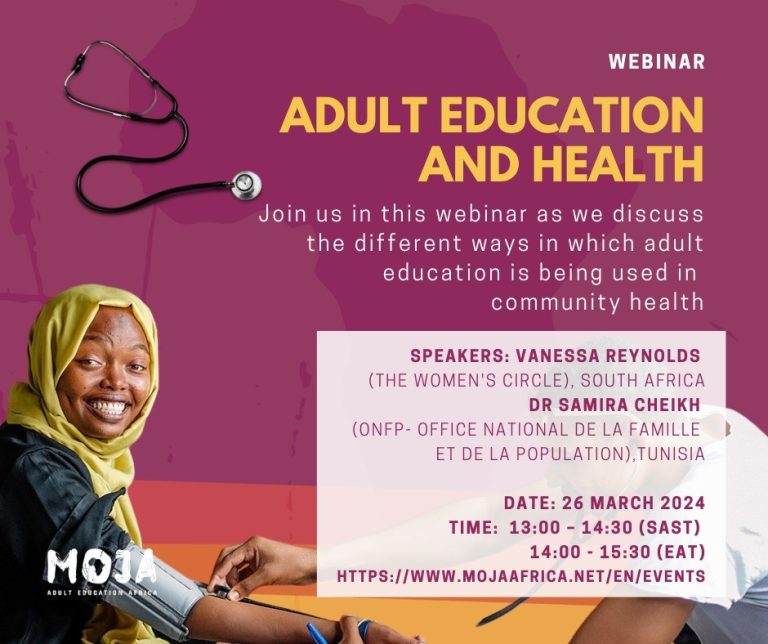MOJA Webinar explores the Intersection between Adult Education and Health
2 April 2024 | Joseph Masonda | DVV International Tanzania ALE Benefits of ALE In Africa Health

MOJA webinar explores the Intersection between Adult Education and Health
In Africa, education plays a crucial role in empowering women and addressing community health challenges. Confronted by the need to raise awareness about reproductive health and gender issues and to address some of the community challenges affecting youths and adults, MOJA held a webinar exploring the intersection between adult learning and education (ALE) and health on March 26th.
The webinar featured two presenters. Firstly, Dr Samira Sheik, a specialist physician in reproductive health and family planning from Tunisia, and Director of the Reproductive Health and Family Planning Centre in Tunis (ONFP). Secondly, Vanessa Reynolds, Coordinator of The Women’s Circle in Cape Town, South Africa, an organisation that takes a holistic view on community health, while working with women in12 townships around Cape Town.
The webinar sought to explore the intersection between ALE and community health, focusing on a wide range of topics, including reproductive health education, community empowerment, and the use of digital platforms and technology for health education and advocacy.
As always, participants were encouraged to actively engage with the presenters and share their insights and questions. Opening the event, Oumayma Kefi, African Continental Project – MOJA Communications Officer for North Africa, shared some information about the MOJA Platform (https://www.mojaafrica.net). MOJA is Africa’s only digital platform dedicated entirely to ALE, aimed at facilitating the building of an African ALE community through emphasising the importance of connections among adult education practitioners across Africa.
During her presentation, Dr. Samira discussed, among others, some differences in approach between reproductive health education for adults and teenagers, noting that cultural and religious factors are often important factors to consider. She also emphasised the need to raise awareness about reproductive health through increased community involvement, particularly among young people.
Community involvement is crucial in promoting health awareness, particularly among young people.
She presented the mobile app used by ONFP (Office Nationale de la Famille et de la Population) in Tunisia that allows users to access information and resources about the various health services available. The example is something that can be replicated elsewhere.
Vanessa Reynolds shared the objectives and spoke about the impact of The Women's Circle (TWC), a community education and service organization in Cape Town. She emphasized the relevance of their work in addressing community challenges and promoting lifelong learning through a participatory approach. She discussed the organization's mission to create an empowering environment for women and the importance of adapting their model to suit specific community needs. She highlighted some of the challenges faced by rural communities and the value of popular education tools in addressing social, political, and economic issues. She also shared about their work with communities in the Cape Flats, where in addition to community health issues and access to healthcare, they also seek to address problems such as hunger and food security.
Our work empowers women and communities to address social, political, and economic issues.
Attendees participated actively in discussions following the presentations, asked questions, and shared some of their own experiences. This interactive format allowed for meaningful dialogue and knowledge sharing among participants. Asked how she ensures accessibility of reproductive health information to all, including marginalized populations, Dr. Samira replied that they make use of a variety of methods, including providing access via downloadable resources and information in public spaces. They are also planning to promote and share information via radio.
Nadia, who is a veterinarian working for rural women's empowerment, agreed with Dr. Samira's approach and suggested building partnerships with organizations working on women's empowerment in rural settings. She shared about a platform they use for mapping partners in hard-to-reach areas and encouraged the establishment of partnership with ONFP. Dr. Samira agreed, adding that they also have a mobile clinic equipped with an ultrasound machine which they use to reach remote areas.
Another question raised was about the Tunisian app’s accessibility for illiterate individuals and how they can comprehend its content. Dr. Samira explained that the app includes images, explanatory audio recordings, and subtitles to aid comprehension.
Abdoulaye Konota from Mali asked if there were complementarities between Dr. Samira and Vanessa's approaches to adult education and health. Relevance was identified as a key factor. Offerings must respond to the needs of communities. Accessibility is also important. Dr. Samira pointed out that all reproductive health services, including contraceptives and abortions, are free in their centres.
Attendees continued to share their experiences regarding health and ALE and expressed their hope for more MOJA webinars in the future.
Closing the event, Oumayma Kefi guided the attendees through the process of signing up and becoming part of the MOJA Platform, emphasizing the importance of sharing resources, events, and experiences from around the continent. She also appealed to organizations working in adult education to join the platform in order to enhance engagement and increase advocacy.
If you missed the webinar, or just want to see it again, you can view it here:
https://web.facebook.com/1779474885/videos/1424687735075991/